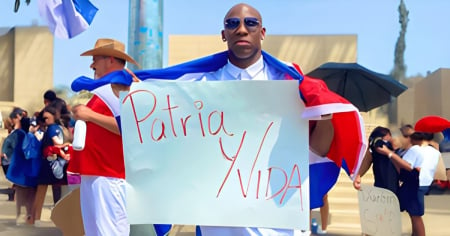José Daniel Ferrer (Palmarito, Santiago de Cuba, 1970) was released from prison just a week ago, having been freed on January 16 by the regime of Miguel Díaz-Canel following an agreement reached with the Vatican and coinciding with former President of the United States, Joe Biden's decision to remove Cuba from the list of state sponsors of terrorism, a measure that his successor in the White House, Donald Trump, rescinded on the same day of his inauguration. Since then, no other political prisoners have been released from the Castro's dungeons.
In this context, José Daniel Ferrer is aware that his days on the street may be numbered. "At any moment, I could go to prison," he said in an interview granted this Thursday to CiberCuba, where he recalled his days in jail, the solitude of a solitary confinement cell; his readings, his verses, his relationships with the guards and with common prisoners, and the moment he learned that he was going to be released.
Ferrer did not hesitate to point out that the hardest part of his confinement was undoubtedly the fear that his two-year-old son would forget him, something he knew his older children would not do due to their age. When he entered Mar Verde, the child he had with his wife, Dr. Nelva Ortega, was only two years old; now he is five and has a terrifying fear that someone might put his dad in a car and take him away to prison once again. That, he asserts, hurts more than a beating.
Inside the prison, José Daniel Ferrer claims he lived through "a hell" and that although this time he has only spent three and a half years behind bars, he insists that a minute in jail becomes an eternity, especially at the beginning when he was not allowed to read, write, or watch television. Shortly thereafter, thanks to international media pressure, he was allowed to gather information through Canal Caribe, Telesur, and Russia Today. With the manipulated information that each of these channels broadcasts, he pieced together clues and began to understand what was actually happening in the world.
Especially painful for him was the news of the Russian invasion of Ukraine in February 2022, when he had only been in prison for a few months and it was just when he was allowed to watch television for the first time.
Don't forget that most of the time he spent without being able to talk to anyone because the prisoner closest to him was 20 meters away, and the guards watching over his cell did not want to speak to him for fear of being recorded with hidden cameras and microphones. José Daniel Ferrer says he searched his cell and didn't see the microphones, but paranoia existed among the military.
The leader of Unpacu recounts that while in prison, he received food sent by his family, which, thanks to the generosity of relatives and friends, was enough not only for him but also to help other inmates, as no one could stop him from sharing with those who had nothing to eat.
Regarding his release, he recounts that he learned through RT about the ongoing negotiation to free 553 political prisoners in Cuba. Someone had already told him that they had heard he would be released, so he gave away his belongings, distributing everything among the common prisoners, and he was ready to leave when he was informed that he had to speak with several judges and prosecutors who had come to the prison. They warned him that he could be incarcerated again at any moment. He did not want to negotiate. He was about to return to his cell when they nearly expelled him from the prison. They didn’t even allow him to collect his glasses, his economics and medicine books, or his vitamins. They pushed him out of there with his wife and his five-year-old son, who were waiting for him outside.
Back at home, where he receives countless expressions of affection and many visitors every day, José Daniel Ferrer took the opportunity during the CiberCuba interview to apologize to Mario Díaz-Balart for not being able to speak with him when he called; he also mentioned the former Spanish Euro MP José Ramón Bauzá and extended greetings to others he has been able to converse with, such as Republican Senator Rick Scott, former governor of Florida, and the head of the diplomatic mission of the U.S. Embassy in Havana, Mike Hammer. Although he did not name anyone, he also expressed gratitude to a Nordic leader who reached out to him as soon as he was released. However, he has missed a diplomatic call from the European Union.
Upon leaving prison, Ferrer claims that he has found a different country. He verified this during a walk through the central streets of Santiago de Cuba, which he found completely empty due to massive emigration and because Cuban families are constantly searching for food. He also stated that he believes the regime benefits from releasing political prisoners, although he fears that they will now keep prisoners of conscience behind bars while releasing common criminals to "satisfy" the Vatican.
In any case, he is prepared to engage in politics in the future Cuba, should the opportunity arise for the people to participate in free and democratic elections. He is also ready to return to prison. At present, he appears calm, but is aware that his release may be temporary. The political police keep a strict watch over his home and have already warned those who visit him that if they are seen there more than once, they will get into trouble.
Filed under:
